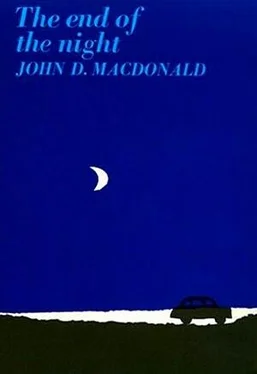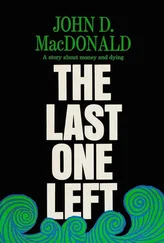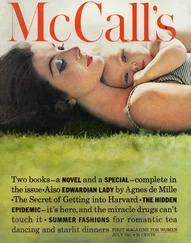His eyes are set wide. His nose is slightly flattened at the bridge as the result of an automobile accident when he was seventeen. This gives him a little bit of the look of a rough-neck. His features are rather heavy. One could say he is relatively more attractive as a young man than he will be ten years from now, should his life be spared.
There has been much comment in the press about the incongruity of his wholesome appearance contrasted with the savage crimes in which he participated. Some have used the expression “baby-faced.” This seems to me quite inaccurate. I would call it a poster face. It could be used to advertise ski resorts or cruises or enlistment in the service. There is nothing sinister about the appearance of this young man. He looks wholesome and rugged.
As I have said, he has a considerable amount of poise. And he has a habit of looking at you very directly. It is a directness almost disconcerting. He is as immaculate about his person as a cat. He moves easily and well. He listens with flattering respect and attention, and scrupulously calls me “sir.”
In the beginning, when I began to pay my periodic visits to each of the four defendants, I felt much more at ease with Stassen than with the others. Over these weeks, this situation has become reversed. I can communicate with Kirby Stassen to an astonishingly limited degree. It is like driving a nail through soft pine into tool steel. The first few strokes are easy. Further penetration is impossible.
Some of this, of course, may be no more than the usual lack of contact between generations. It sometimes seems to me that the Great Depression marked the beginning of a special change in our culture. All young people born during or after those years seem to act toward the rest of us with a great deal more tolerant disrespect than can be accounted for merely by the difference in ages. New standards of behavior have infected the world. The divergence seems to be growing more acute rather than diminishing.
I have discussed this observation with my closest friends. They seem aware of it, but the reasons they give do not satisfy me. Proctor Jonnson, a practicing psychiatrist, said that in his opinion this new generation has been subjected to such a bewildering, contradictory series of social and cultural stresses and strains that they have ceased trying to establish any sequence of relative importance of ideas and objects. They’ve had the blissful reassurance that no matter what they do, society will nurture them, and so they have no compulsion to consider a career more important than an ability to water ski. He says we have deprived them of an appreciation of reality by depriving them of challenge.
On the other hand, George Tibault, a professor of sociology at Monroe College says that we cannot communicate with our young because they have no inner direction, no code of behavior based on an ingrained ethical structure. He says they will adjust their own codes over and over, depending on the accepted behavior patterns of each group within which they find themselves. This, he claims, is a splendid mechanism which enables the young to meet the survival requirements of our society better than we older ones, with our inner burden of rightness and wrongness. I told him I thought this rather cynical. He smiled and quoted a dictionary definition of cynical. I wrote it down. “Given to or marked by sneering at evidences of virtue and disinterested motives; inclined to moral skepticism.”
I had to confess that it seemed to fit the tenor of our times, as reflected in the public press.
But all that does not solve the mystery of Kirby Stassen. Here is a transcription from Miss Slayter’s notes:
“To take just one example, Kirby, I would like to ask you this. Do you feel that you would have killed or helped kill Horace Becher if you’d been alone, or with a different group?”
“The question doesn’t make much sense, sir.”
“In what way?”
“I’d never have seen the man unless it happened just the way it did. So how can I tell you what I would have done?”
“Surely you’ve got enough imagination to make up a situation where you would have come in contact with Horace Becher in some other way.”
“What kind of way, sir?”
“Say you were hitchhiking alone and he picked you up. Would you have killed him?”
“There wouldn’t be much sense in that, would there?”
“You imply that there was sense in the way he was killed?”
“No, sir. That was just the way it happened. It wouldn’t have happened that same way again in a thousand years. That’s why I can’t see the sense in these hypothetical questions, sir.”
“Just as a game, then, can you devise a situation where you would feel called upon to kill that man?”
“I guess so. You mean all alone, don’t you? I guess if I escaped from this place and hitched a ride with him and he turned the car radio on and figured out who I was. And if we were in the right sort of place. I guess I could do it. I’m not sure, but I think I could do it all right.”
“Would you feel you were doing wrong?”
“Oh, I know it would be wrong, sir. Anything against the law is wrong, isn’t it?”
“But would you feel guilt? Remorse? Shame?”
“That would depend on who he was, I’d say.”
“I don’t follow you.”
“I mean if he was a valuable person, I mean that would be a waste. But if he was just... you know... a real drag, ignorant, stupid, a loudmouth type. Why should anybody feel a big load of guilt about that?”
“He was a human being, Kirby.”
“I know, sir. With desires and aspirations and an immortal soul. But in the scheme of things, that joker was just about as significant as a gob of spit on a wet sidewalk, and just about as attractive.”
“Oh, then you admit the existence of some scheme of things?”
“Don’t you, sir?”
“Of course I do! Describe to me what you’d call a valuable person.”
“Well... somebody who’s willing to live way out, sir. Somebody who doesn’t go along with the whole cruddy regime. Somebody who’s willing to try to bust the race out of this big trap we’ve gotten ourselves into. Like Sandy says, somebody who can give love without keeping a set of records on it.”
“Do you consider the four of you to be valuable people, Kirby?”
“I don’t want to sound disrespectful, sir, but that’s a pretty stupid question.”
“I take it you don’t call yourself valuable?”
“We’re all just as nothing as that Becher.”
“But you felt capable of judging him?”
“Who judged him? He was all creep. He wasn’t a rare specimen. There’s twenty million of him, all so alike you can’t tell them apart.”
“Kirby, what I’m trying to do is reach you — find some common area of agreement, so we can talk.”
“I understand, sir, but we never will.”
“What do you mean?”
“The pipes are clogged. The semantics are bad. Take an object — pencil, automobile, bank vault — we can agree fine. But when you get onto love and guilt and hate, we just can’t follow each other. The words don’t mean the same things to me they do to you. I went through that whole Mexican thing twice, and you can’t get with it.”
“I can’t see any pertinence to it.”
“If you could understand the significance of that, you could understand how all the rest of it happened.”
“Yes, I...”
“I’ve explained to you the way I plan to defend you.”
“Yes, sir. This business of working on each other... intoxicating each other. You want to make us sound like an accident that just got together and happened. Do you think it will work, sir?”
“I don’t think anything else will.”
“Okay, if I was alone maybe I couldn’t have killed that salesman. That’s a stupid answer to a stupid question, sir, but maybe it will help you out.”
Читать дальше







![Джон Макдональд - The Hunted [Short Story]](/books/433679/dzhon-makdonald-the-hunted-short-story-thumb.webp)


